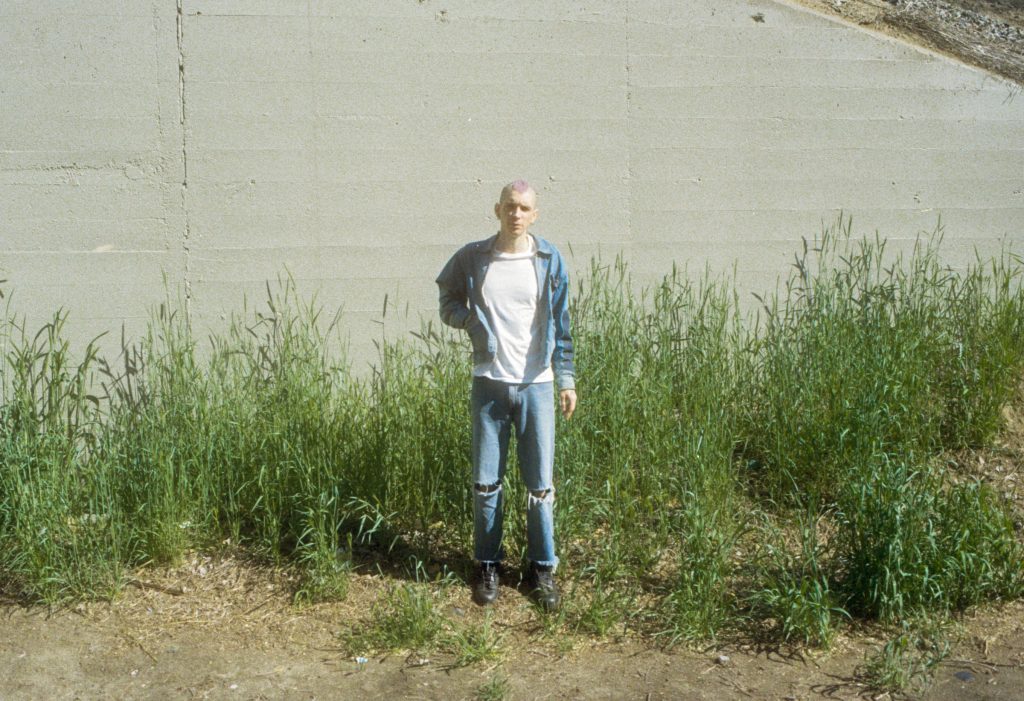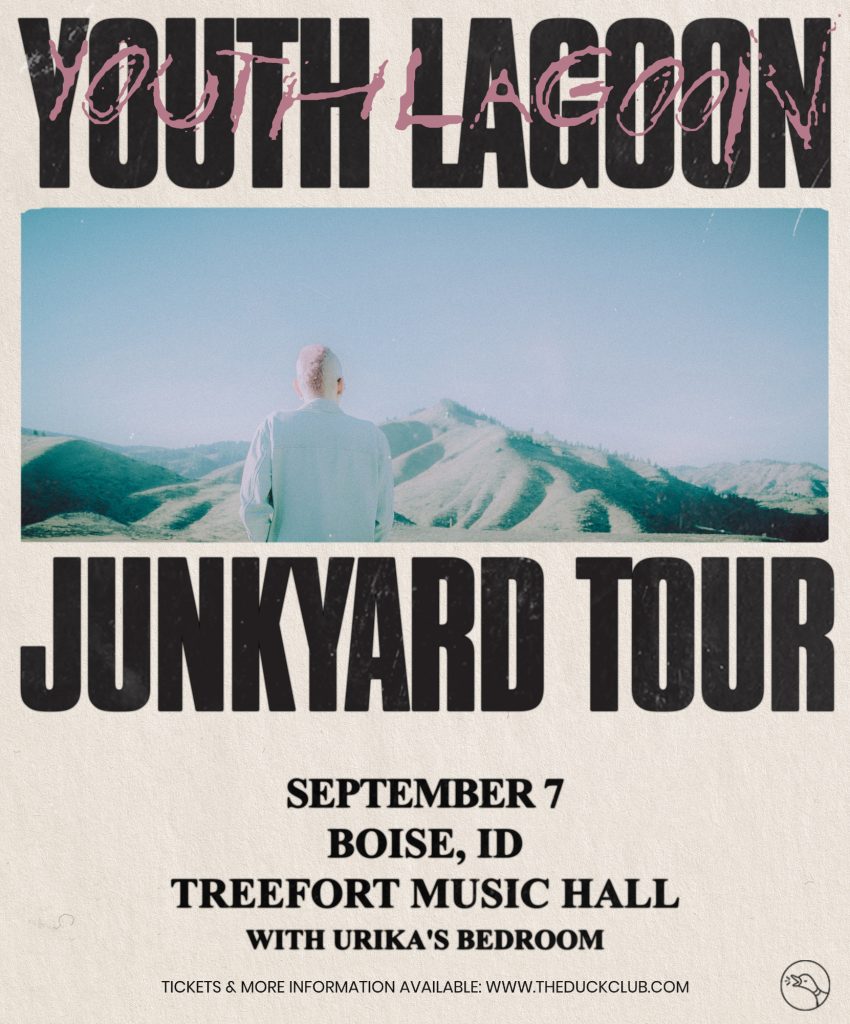YOUTH LAGOON + urika's bedroom
Thursday, September 7th, 2023



In 2016, Trevor Powers shut the door on Youth Lagoon. “I felt like I was in a chokehold,” he says. “Even though it was my music, I lost my way. In a lot of ways, I lost myself.”
Stepping back from the alias, Powers found personal transformation at his home in Idaho and released experimental tapes under his own name (2018’s Mulberry Violence and 2020’s Capricorn).
“My mind has always been a devil,” says Powers. “It tells me terrible things—like I’m worthless, ugly, or broken. It’s like a motel TV stuck on a channel that won’t shut off, with static and endless late-night ads and preachers screaming about the end of the world.”
In October 2021, something changed the channel.
After taking an over-the-counter medication, Powers had a drug reaction so severe it turned his stomach into a “non-stop geyser of acid,” coating his larynx and vocal cords for eight months. “I saw seven doctors and multiple specialists. I lost over thirty pounds. No one could help me,” says Powers. By Christmas, he could no longer speak, turning to text messages and a pen and paper as his only ways to communicate. “I wasn’t sure if I’d ever be able to speak again, yet alone sing,” he says.
“It all felt symbolic in a way,” he adds. “I’d been swallowing fear all my life and now here it was coming back up. I used to think God watches people suffer. Now I know She suffers with you. That changed everything.”
The growth that followed that nightmare narrowed Powers’ focus. Rather than writing about the world at large, he started writing about home. “Family, neighbors, and grim reapers,” laughs Powers. “I’ve always written about far away things. That was my way of running from home. But the best material has been right in front of me this whole time in Idaho.”
With whispers of country, Heaven Is a Junkyard is mutant Americana in a world of love, drugs, storytelling, and miracles—held together by Powers’ voice and an upright piano. “If a lyric wasn’t right, a song wasn’t right,” says Powers, who scrapped two-and-a-half albums worth of material because it “wasn’t honest.”
“Heaven Is a Junkyard is about all of us. It’s stories of brothers leaving for war, drunk fathers learning to hug, mothers falling in love, neighbors stealing mail, cowboys doing drugs, friends skipping school, me crying in the bathtub, dogs catching rabbits, and children playing in tall grass,” says Powers.
Throughout the album, he stitches together a lyrical style that feels both punk and western. “Daddy come home, and Daddy’s on junk,” Powers sings on Idaho Alien—nestled between a saloon-style piano and a rhythmic hiss that sounds like a baby monitor. Prizefighter, the album’s third track, was written while watching a VHS of “Drugstore Cowboy.” Against a gauzy curtain of lap steel guitar and a CR78 drum machine, he explores the bond between two brothers, leaving it undefined what is fact and what is fiction. “Tommy left for war with no goodbye. I never got a chance to ask him why,” he sings.
The Sling, a song Powers refers to as “the album’s core,” is a ghostly and naked piano ballad. We hear each line like a voyeur peeping through a crack in the wall. “On a lonely street, children still play. Families still eat,” he sings. Heaven Is a Junkyard is a phrase Powers wrote down in his journal after watching a neighbor’s farmhouse catch fire. “I wasn’t even sure what those words meant at the time,” he says. “I’m not sure I still do.” But when the album’s title is heard at the end of The Sling, it feels substantial.
“Heaven is a junkyard, and it’s my home,” sings Powers.
Recorded in six weeks with co-producer Rodaidh McDonald (The xx, Adele, Gil Scott-Heron), Heaven Is a Junkyard is a work of absolute devotion. A portrait of the God-haunted American West. And a reminder that there is always love in the tall grass.
“Youth Lagoon was never the chokehold,” he pauses.
“I was.”

urika’s bedroom
The bones and performance of a urika’s bedroom song are, approached from afar, certainly recognizable as rock music. Eagle-eyed genre-spotters might see it as slowcore, shoegaze, dreampop, emo-adjacent bedroom pop, mumblecore, or any other heavily hyphenated amalgamation of melodically-inclined indie or alternative rock.
But the true character of these songs reveals itself in their transmission. Coated in digital gauze, urika’s bedroom’s near-whispered exhortations are cast against spindling and silvery guitar lines, transmogrified vocal layers, fascinating artifacts of malfunctioning audio interfaces, and intrusive textural figures that hit like ambulance sirens bleeding into one’s private headphone symphony. The sound design is idiosyncratic and immaculate, a cryptic and modern rock idiom birthed from a diplomatic sonic union between Billy Corgan and Christian Fennesz.
On Big Smile, Black Mire — the full length debut due out November 1, 2024 on True Panther — urika’s bedroom presents this unique vision in full, rendering a shadowed yet lucid depiction of longing, alienation, and multivalent emotional experience with an assured command of avant- garde gesture. It’s a marvel of scene-setting, a showcase for urika’s bedroom’s instinctive understanding of what makes for an evocative and devastating arrangement.
“A lot of it is pulling from this point of emotional juxtaposition, the ability to feel multiple emotions at once, internally as well as externally,” urika elaborates. “You’re never 100% sad or 100% happy. On this album, I’m subconsciously tapping into that conflict, of feeling one way and being another.”
Big Smile, Black Mire is the culmination of several years of artistic growth and refinement for urika’s bedroom. After a warm reception to early singles “Junkie” and “XTC” — both of which appear on bsbm — the LA-based artist brought the project’s insular sound into the real world, touring with the likes of Youth Lagoon, Nourished By Time, and Chanel Beads while also collaborating as a producer and co-writer with untitled (halo) and Ded Hyatt. Self-produced and engineered by urika’s bedroom with additional mixing by Chris Coady (Yeah Yeah Yeahs, Beach House, DIIV), Big Smile, Black Mire is built upon the modern art of guitar processing and recontextualization. By and large eschewing synthesizers, urika’s bedroom — with contributions from ub touring guitarist Silas Johnson, who otherwise records as Tracy — sculpts an expansive universe of timbres and tones, ranging from trashy and lived-in skronks to tremulous and liquid beams of melody.
For instance, “XTC” is a grime and glitter daydream, while “Video Music” is a collision of glitchy percussion and surreal imagery, scrambling to make sense of a romantic preoccupation: “how to keep you out my head / today, don’t you think it’s all the same? / racing through this bloodswept cage / today, it tastes like lithium and rain.” Meanwhile, “Circle Games” is ominous and industrial, a rattling meditation on societal decay and “post-war everything.”
However, any solipsistic dread is cut with a steadfast sense of hope — as on the swirling devotional “Metalhead” — and a resounding empathy for the struggles of others. The spoken interlude of “bsbm,” one of several tracks featuring vocals from multidisciplinary artist Vivian Buenrostro, works through word association to grasp for pure humanity amid the technological ennui.
“Lately when I see somebody encountering challenges, I still recognize the innocent child they once were,” says urika. “On a social or individual level, life is always about growth or collapse. But even in that collapse, there’s a capability to find light and darkness.”
Big Smile, Black Mire is an adept and artful expression of that duality — as urika puts it, “taking a selfie in front of a burning building.”







